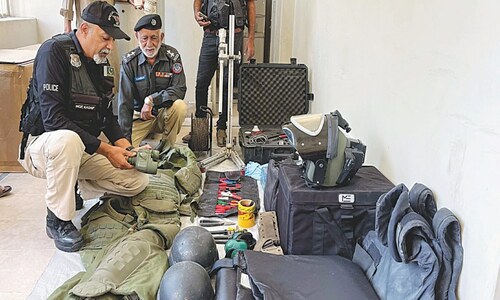KARACHI, Jan 24: The tomb of Jam Nizamuddin II, considered the greatest of the Samma kings of Sindh, located in the sprawling Makli necropolis near Thatta, is in danger of collapse and efforts must be made from the floor of the National Assembly to save the historical monument.
This was stated by Dr Ghulam Mohammad Lakho, former chairman of Sindh University’s journalism department, while delivering the keynote address at a conference on the Samma era held at the University of Karachi on Saturday.
Titled ‘National literary conference on Samma period,’ the seminar was organised by KU’s department of Sindhi in collaboration with the Sindh government’s department of culture and tourism.
Dr Lakho said Jam Nizam’s tomb was considered an architectural monument and termed it “the jewel of Makli,” adding that it was tilting and if efforts were not made forthwith to save it, the tomb might collapse. He said 2009 should be declared the year of Jam Nizamuddin and an international conference should be held in this regard.
Before discussing the Samma era, which lasted from around 1335 to 1520, Dr Lakho said the department should have conducted its first seminar on the period of Arab rule over Sindh as it lasted three centuries and had a major impact on Sindhi culture. He added that all the great writers and poets of Sindhi are from the Arghun, Tarkhan and Mughal eras.
“Who were the Sammas and where did they come from?” he asked. He said the Sammas were one of the various Buddhist tribes of the region who supported Umayyad general Mohammad Bin Qasim when he arrived in Sindh. Arab rule was followed by the Soomra dynasty, while Mahmud Ghaznavi’s conquest of Mansura (formerly Brahmanabad), the Soomra capital of Sindh, paved the way for the Sammas to take power. “By accepting Islam, the Sammas strengthened themselves. When the Soomra dynasty fell, the political situation in the region was very complex.”
He said the first Samma ruler was Ferozuddin Unnar, who took the title of Jam, which would be used by all successive Samma kings. He added that the Sammas resisted the Tughlaqs and Jam Tamachi wanted independence from the Delhi Sultanate, to which the Sammas paid nominal tribute.
However, Amir Taimur’s sack of Delhi in 1398 ensured the Sammas’ independence from the sultanate.
A period of peace
Coming to the rule of Jam Nizamuddin II, Dr Lakho said it was a time when men of learning were supported by the state. The Jam himself was said to be a pious man, observant of his religious duties, while historians also praised him. Jam Nizam also encouraged a spirit of amity between the Hindus and Muslims who lived in his domain.
But when Jam Feroz, Nizam’s son, took the throne, Dr Lakho said he proved to be “an unworthy successor to his father,” adding that he was squeezed between two great powers of the time: Shah Ismail Safavi in Iran and Mughal Emperor Babar.
He said the Sammas encouraged education and religion, adding that while Muslim Sammas ruled Sindh, their Hindu clansmen were in power in Kutch. Arabic was in widespread use during Samma rule while Persian gained ground. During Jam Nizam’s time, the Holy Qur’an was translated into Persian.
Sufis of the Qadri and Suhrawardy orders were active in the realm and were encouraged and supported by the state, while cultural activities and development was at par in both urban centres and villages.
Professor Dr Akhlaq Ahmed, KU’s pro vice-chancellor, said the Samma era was one of great peace and prosperity, adding that during this period Sindh was known as Arab as-Sagheer or Little Arabia.
‘A huge mandate’
KU vice-chancellor Prof Dr Qasim Raza Siddiqui, who presided over the inaugural session, said the raison d’etre behind holding such conferences was to acquaint people with the past, present and future of Sindh. He said Sindh’s culture has affected all the cultures of Pakistan as these overlap. Referring to Jam Nizamuddin, the VC said the Samma king’s ascension was widely welcomed by all segments of society and that if related to today’s political system, he had “a huge mandate.”
He added that throughout history, as Muslim rulers’ conquests increased, their attachment to knowledge and learning decreased.
Sindh Law Minister Mohammad Ayaz Soomro, who was chief guest at the event, said the Sindh government was working on translating key works on the province in English and Urdu into Sindhi. Straying from the theme of the conference, the minister chose to discuss politics instead, as he said there was a common perception that students from the rest of Sindh were not allowed to study in Karachi’s educational institutions.
“Karachi is Sindh and Sindh is Karachi. We are examining the laws. It is not written anywhere that the door of an educational institution will be closed on anyone. We will take this up in the Sindh Assembly.”
The vice-chancellor later said that there was no “ethnic policy” in force at the university. He added that the policies of all universities of Sindh should be examined and a new, better policy should be framed.
Earlier, Prof Dr Khursheed Abbasi, chairperson of the Sindhi department, paid tribute to recently deceased poet Tajal Bewas, who was a member of the conference’s organising committee, during her introductory remarks.
The conference began with a recitation of the Holy Qur’an and a stirring vai of Shah Abdul Latif Bhittai. Several politicians, including Public Accounts Committee chairman Jam Tamachi Unnar and Sindh Assembly member Abdul Razaque Rahimoon – who are descendents of the Sammas – also briefly spoke during the inaugural session.














































Dear visitor, the comments section is undergoing an overhaul and will return soon.